A week ago, the leaked transcript of the January telephone call between Malcolm Turnbull and Donald Trump revealed Turnbull had told the president, “You can count on me. I will be there again and again.”
Now, as the US-North Korea verbal war intensifies, with fears it could run into a military conflict, Turnbull has made specific that general pledge.
In extended comments on Melbourne’s 3AW on Friday, Turnbull declared: “Be under no misapprehension – in terms of defence we [Australia and US] are joined at the hip”.
“Let’s be very clear … If there is an attack on the United States by North Korea, then the ANZUS treaty will be invoked and Australia will come to the aid of the United States, just as if there was an attack on Australia, the United States would come to our aid.”
Asked what would happen in the event of an attack on the US territory of Guam, Turnbull said: “We would come to the aid of the United States. Now, how that manifests itself will obviously depend on the circumstances and the consultations with our allies.”
North Korea is threatening to launch missiles not at Guam itself but in the ocean nearby.
Ahead of a Friday briefing from military chiefs and intelligence and foreign policy experts, Turnbull underlined his point: “We stand shoulder-to-shoulder with the United States”. The worsening crisis was among topics discussed in a Thursday night telephone conversation between Turnbull and US vice-president Mike Pence.
The 1951 ANZUS treaty says: “The Parties will consult together whenever in the opinion of any of them the territorial integrity, political independence or security of any of the Parties is threatened in the Pacific”. (Article III)
“Each Party recognizes that an armed attack in the Pacific Area on any of the Parties would be dangerous to its own peace and safety and declares that it would act to meet the common danger in accordance with its constitutional processes.” (Article IV)
Despite the tight alliance, only once has ANZUS been invoked – by John Howard after the September 11 2001 attacksv
Mostly, when Australia has stood with the US militarily, the treaty has been not relevant or not needed.
Nor has ANZUS or the wider American alliance meant the US automatically supports Australia. Australian efforts to get America involved in regional clashes, notably Indonesia’s claims to West New Guinea, and the Indonesia-Malaysia confrontation of the 1960s, were met with resistance.
Geoffrey Barker wrote in 2015, “In fact the US commitment to ANZUS has never been as strong as the Australian commitment”.
While Turnbull has trumpeted the message that Australia would support the US in a conflict with North Korea Hugh White, professor of Strategic Studies at the Australian National University, believes he has given a narrow, literal interpretation of the treaty and gone further than he had to.
“He’s missed the point that we have the right to judge our interests”, White says. “Under article IV there is an obligation to act – there’s no obligation to act by contributing military forces. It’s always acknowledged that each side has the right to make a judgement about the kind of response it makes.”
The judgement, White argues, would depend on the particular circumstances. He outlines four scenarios of military conflict.
… an attack by the United States on North Korea, which some believed Trump building up to in his words earlier this week, when he said continued threats to the US “will be met with fire and fury like the world has never seen”;
… an attack by North Korea on the US;
… North Korea firing its missiles to near Guam, but not on Guam;
… A pre-emptive strike by the US to prevent North Korea completing the development of an intercontinental ballistic missile (ICBM) capability.
White says that Turnbull has walked past the complexities of what might happen, and asks: “Is it in Australia’s interests to encourage the US by saying we’d support it unconditionally ?
Foreign minister Julie Bishop had been more circumspect. When it was put to her this week that we would be in the fight, if it came to that, given both ANZUS and Australia’s being a party to the Korean War ceasefire, she said: "In fact we were not a party in the legal sense to the armistice so there is no automatic trigger for Australia to be involved. As far as the ANZUS alliance is concerned, that is an obligation to consult. But of course we have been in constant discussion with our friends in the United States”.
Bishop carefully kept options open.
It is worth noting, however, that Kim Beazley a former defence minister, has a different view of the ceasefire agreement. He wrote in The Strategist: “At the signing of the armistice in Korea in 1953 we agreed, with South Korea’s allies, that we would defend the South in the event of an attack by the North.”
If Australia became involved in a military conflict, it would a limited contribution. It would be presence, rather than capability, that (as usual) would be important to the Americans.
As has become evident, Trump’s presidency presents Australia with serious management challenges in the alliance relationship, which is built into the foundations of Australian security policy.
This presidency is unlike any of its modern predecessors, and judging how to handle it is extremely difficult for the government. It’s interesting to note the new administration hasn’t yet even posted an ambassador to Australia.
Turnbull, with his personalised style of operating, has chosen to try to get up close and personal, talking as one businessman to another. Hence the “you can count on me” sort of line.
Turnbull may later nuance his Friday comments, but as they stand, they lock Australia into the unpredictability of unpredictable players. They also reflect, unvarnished, the reality that Australia always answers America’s call.

